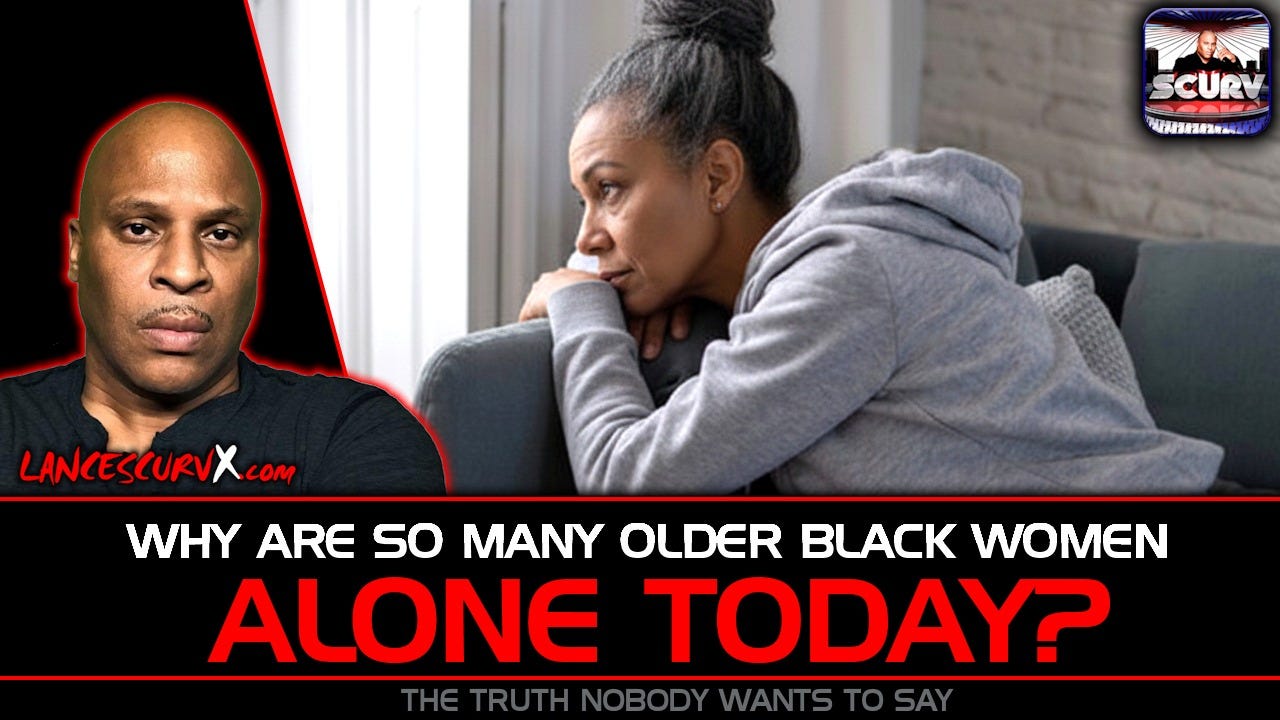There comes a point in life when truth hits harder than any opinion. And today, I want to step straight into that truth. A lot of older Black women—50s, 60s, and even 70s—are sitting in loneliness, confusion, and quiet regret, wondering why dating feels impossible and why good Black men seem to be “gone.” But the truth is simple and painful: many of these women helped create the very conditions that now keep them single.
We have to talk about the mindset that grew out of the feminist movement—especially in the 70s and 80s—when many Black women were told, “You don’t need a man. You can do bad all by yourself.” That message got soaked up like gospel. It became a lifestyle. It became an attitude. And for a lot of women, it became a wall they can’t climb back over now that they’re older and wanting companionship.
For years, many of these women were trained to see Black men as the enemy. They were told he was the problem. He was broke. He was useless. He didn’t measure up. They were told to compete with men instead of cooperate with them. And now, decades later, that teaching is haunting them. Because they’re older, they’re alone, and many of them have built a life full of money, degrees, houses, and careers—but not a single skill when it comes to love, partnership, softness, or understanding men.
We’re dealing with women who built independence but never built relationship wisdom. Women who learned pride but never learned accountability. Women who chased the fantasy of a “perfect man” while ignoring the good men who were right in front of them. And now, the dating world has changed, and these women are finding out the hard way that men want peace, not problems.
So today, we’re breaking down how we got here, why so many older Black women became undesirable partners in the dating world, and what this means for the future. Not to disrespect. Not to tear down. But to speak a truth that has been buried for too long—and is now rising up with consequences everybody can see.
Let’s start with the reality: a lot of older Black women carry emotional baggage that they never healed from. Instead of dealing with heartbreak, childhood wounds, or their broken relationships from decades ago, many hid their pain behind strong-woman talk, careers, and independence. It worked for a while. But now, when they try to date again, all that old pain shows up as distrust, defensiveness, anger, or a quick attitude. Men today don’t want to play therapist to issues created 20, 30, or 40 years ago.
Then we have the entitlement. For decades, these women were praised as “queens,” “boss ladies,” and “independent women who don’t need a man.” They were told THEY were the prize. They were told THEY were enough. Yet they were never told they needed to bring cooperation, warmth, or accountability into a relationship. Now they want love, but cannot switch off the tough act. They expect leadership but refuse to follow. They want protection but won’t give peace. They want love but fight every man who tries to get close.
Financial problems also play a role. A surprising number of older Black women lived fast in their younger years—spending, partying, living for image, living for attention. Now life is expensive. Bills are heavy. Retirement is coming. And suddenly, the same women who said “I don’t need no man” are looking for a man to rescue them from years of poor financial choices. Men see this instantly. They don’t want to fix someone else’s lifetime of chaos.
Another major problem is unrealistic expectations. Many older women are still chasing the imaginary “high-value man” they thought they deserved in their 20s. But they never ask themselves what THEY bring that such a man would want. Many still judge men through a fantasy that never matched reality. They want a man who is rich, tall, fit, emotionally wise, respectful, loyal—but they don’t offer anything close to what they demand. They want the king without becoming the queen.
And let’s address femininity. Decades of survival mode made many older Black women hard. Tough. Cold. Loud. Defensive. Masculine. They lost the softness that builds connection. They lost the patience that builds love. They lost the warmth that men are naturally drawn to. A man doesn’t want to come home and compete with his woman. He wants a partner, not a rival. And when a woman brings nothing but stress into a man’s life, he simply chooses peace elsewhere.
Today’s men—especially Black men ages 45 to 60 and older—are done with the fight. Their kids are grown. Their bills are paid. Their peace is priceless. They are traveling, enjoying life, and discovering that women in other cultures actually value them, appreciate them, and WANT them. So when they meet older Black women who carry attitude, baggage, entitlement, and a long list of demands, they walk away without looking back.
Older Black women aren’t losing men because men have changed. They’re losing men because the world they believed in—the world that said independence is the path to happiness—was a lie. The lie produced loneliness. The lie destroyed families. The lie convinced them that being difficult was power. And now, in their later years, they are paying the price for decisions made decades ago.
But there is a path back—if accountability enters the room.
MY FINAL THOUGHTS…
At the end of the day, loneliness didn’t fall out of the sky. It was built over time. And many older Black women must admit this: the life they built was built without men, so now it is a life that does not attract men. That is a hard truth, but it is still truth.
If a woman wants companionship at 50, 60, or 70, she must stop fighting the wrong war. Men are not the enemy. Black men were never the enemy. But too many women were taught they were. And now they must unlearn those lies if they want a different outcome. Healing must replace ego. Accountability must replace excuses. Softer communication must replace loud pride.
Here is the truth: a man wants peace. He wants cooperation. He wants a woman who respects him, values him, and brings warmth into his life. Not competition. Not chaos. Not trauma dressed as strength. Men are not asking for perfection—they’re asking for peace. And peace has become rare.
If older Black women want love in their later years, they must step out of the mindset that kept them alone. They must rebuild femininity, not for men alone, but for their own happiness. They must learn the art of partnership again. Because independence without companionship is a cold reward.
In the end, men today are choosing their peace over someone else’s problems. And women who refuse to change will stay seated at a table where no man sits with them. But women who choose growth—real growth—can still build love, still build connection, and still build a future that doesn’t end in regret.
The truth might hurt, but healing never comes through lies. It comes through facing reality, learning from it, and becoming better from it. That’s the only way forward. And for many older Black women, this is the last chance to make that change before loneliness becomes permanent.













